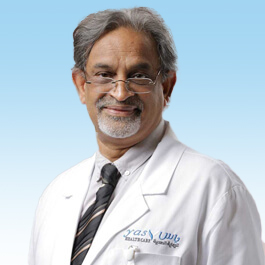

Set in a modern facility, Yas Healthcare’s Cardiology Department is conducted with skill, expertise and personalized care.
Through Advanced technology we utilize up to date methods for the assessment, investigation and management of suspected cardiac patients which usually requires a combination of General Evaluation, Advanced non Invasive Evaluation & Advanced Invasive Evaluation.

Dependent upon the type and severity of symptoms and/or the presence of any abnormal clinical findings identified during the clinical examination, more advanced cardiac investigations may be required. These investigations could include a combination of the following non invasive tests if clinically indicated
These alternative heart rhythm recorders can be useful in identifying the explanation for infrequently occuring palpitation or to investigate dizzy spells or collapses.
recorders don’t require you to be attached to the monitor permanently – they can be pressed to the chest to take a recording at the time of symptoms – they are most useful for palpitations that are unpredictable, infrequent but prolonged for more than a few minutes. The later point is important as it may take a minute of two for you to recognise your symptoms, find your monitor and find a convenient location for you to apply the monitor to the skin of your chest to take the recording.
require the recording device to be constantly attached to your chest using a few electrodes. They constantly record but dont save the heart rhythm data until a button is pressed on the device. The device will then store the heart tracing recorded for upto a few minutes BEFORE the button was pressed and upto a few minutes AFTER the button was pressed. These devices can be helpful in identifying the cause of infrequent and briefly occuring palpitaion, dizzy episodes and collapses
A blood pressure monitor that is worn for up to 24 hours and that records the blood pressure half hourly throughout the day and hourly overnight. Results from this investigation can help determine whether the blood pressure is abnormally elevated and help determine the requirement for life style change and/ or medication to control the blood pressure more effectively.
An ultrasound scan of the heart at rest. This commonly performed cardiac investigation can provide important information regarding the hearts structure and function. The scan usually takes around 30 minutes and can assess the size and shape of the cardiac chambers, the contractile function of the pumps (ventricles), and the anatomy and function of the cardiac valves themselves.
An ultrasound of the heart during physical exercise or for those unable to exercise sufficiently a scan performed after accelerating the heart rhythm with an infusion of an intravenous medication. This type of scan is most commonly used to assess the likelihood of blood flow abnormalities to the heart (coronary artery disease) but is also sometimes used to provide additional information regarding the function of abnormal cardiac valves.
A 12 lead ECG recorded during physical exercise. This test is commonly performed to assess exercise induced chest pain, breathlessness or palpitation. The test requires you to walk on a treadmill whilst the heart’s electrical activity is recorded. The treadmill starts slowly but will intermittantly increase in speed and slope to accelerate the heart rate slowly. Patients who are unable to exercise on the treadmill, or cannot exercise sufficiently to accelerate their heart rate enough, or who develop abnormalities on the recorded tracings may require additional or alternative tests to confirm or exclude cardiac disease.
A detailed CT scan of the heart and the major blood vessels utilising Xray. This investigation can provide additional information about the structure, size and geometry of the heart and the major blood vessels. Modern cardiac CT (CT coronary angiography) can also help identify the presence of coronary artery disease in patients suspected as having angina from the clinical history and other non invasive tests. As cardiac CT imaging requires exposure to a higher dose of xray radiation than a standard Xray this investigation is not performed unless the suspicion of either ischaemic heart disease or structural heart disease is sufficiently high to justify this test.
A Magnetic Resonance Imaging study of the heart. This investigation is frequently used to provide additional information about the hearts anatomy and function. Not all patients are suitable for MRI imaging and in particular patients with claustrophobia, metallic implants and most pacemaker devices will be unsuitable candidates.
An ultrasound of the major blood vessels carrying blood through the neck to the head. This investigation is often performed in patients with stroke or transient ischemic attacks (mini strokes) and can help identify narrowed segments that may indicate the cause and suggest possible treatment options.
An ultrasound of the arteries within the lower limbs. This investigation can help identify blood flow obstructions that may help explain exercise induced leg discomfort (claudication)
An ultrasound of the kidneys and the arteries carrying blood to the kidneys. This investigation can help identify the cause of abnormal kidney function and may be of value in assessing selected patients with poorly controlled blood pressure.
This investigation is primarily requested to evaluate possible cardiovascular causes of dizziness or collapse. The test assesses the heart rhythm (ECG) and blood pressure (automated monitor) whilst at rest laid flat and quietly on a special tilting couch and then in an upright position whilst still secured to the couch. The test can detect abnormal changes in blood pressure and the cardiac rhythm that can be helpful in identifying the explanation for some collapse events or dizziness.
Notes
* Please note that YAS healthcare currently does not have the facility or equipment for all of the advanced non invasive procedures described above.
In consequence those marked * will, for the time being, need to be performed in an alternative government or private hospital or institution.

Qualifications
M.B.B.S
Internal medicine, Germany
Consultant cardiologist, UK
Interest
Diagnostics